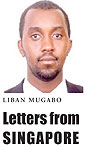Meritocracy is a system that gives its members special rights, privileges, or social status based on a system of merit: by setting up tight and intense competition to find the best people who deserve such rewards. In a meritocratic society, one obtains a high social status, wealth and all the fame and glory, if and only if one can prove oneself as the best. This pushes society forward by underlining the importance of results as an indicator of success.


Meritocracy is a system that gives its members special rights, privileges, or social status based on a system of merit: by setting up tight and intense competition to find the best people who deserve such rewards.
In a meritocratic society, one obtains a high social status, wealth and all the fame and glory, if and only if one can prove oneself as the best.
This pushes society forward by underlining the importance of results as an indicator of success.
Among modern nation-states, Singapore aspires to be a pure meritocracy, with an emphasis on identifying and grooming bright young citizens for positions of leadership. Singapore seeks individuals who show high potential, have strong academic credentials, and who have relevant experience.
This principle has made this tiny nation thrive and transform itself; a superior pool of talent and strong governance are the results.
Similarly, in this world filled with intense competition, a meritocratic system is what Africa needs to successfully take off. Unfortunately, so many African countries have long rewarded mediocrity, often through the channels of corruption or complacency.
This has resulted in mediocre people developing at the expense of the talented, who are regularly sidelined. It is not clear whether this is because these societies are scared that the talented will upset the status quo, or force them out of their comfort zones.
Nevertheless, it is the citizens of these countries who are to blame because of the wrong decisions that have characterized many elections in the past years.
They tend to vote along racial, ethnic and even religious lines instead of pure ability, thus throwing meritocracy out the window.
This is further compounded by the weak leaders, who have embraced mediocrity across the continent by consistently manifesting incompetence in all their deeds during their terms in office.
This takes me to the next point: how Rwanda fares vis-a-vis meritocracy. Rwandans have shown a significant amount of maturity by electing an able leader in President Kagame. Testament of his ability is and is underlined by the rapid development witnessed in the country.
In short, Rwanda is on the right path. The willingness exists to find the brightest, the smartest, the most qualified candidates for national leadership; we have successfully identified and elected such a person for our President.
We also lack the complacency that marks so many of our neighbouring countries; we do not tolerate non-performance and shut out those who are not succeeding in their jobs.
But our major challenge is that we have not yet figured out how to identify the brightest, the smartest, the most qualified candidates for the "middle management” of our country. Once we figure that out, we will reach even higher heights.
Liban Mugabo studies in Singapore


